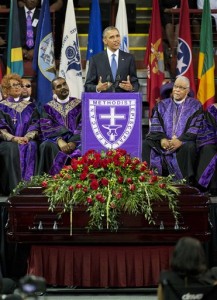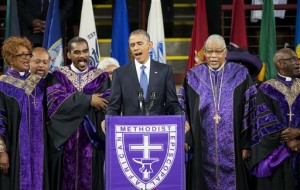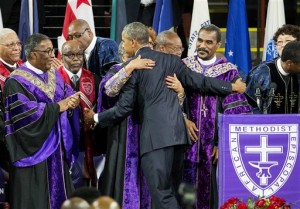
The casket of Rev. Clementa Pinckney sits beneath the podium as President Barack Obama speaks during services honoring the life of Pinckney, Friday, June 26, 2015, at the College of Charleston TD Arena in Charleston, S.C. Pinckney was one of the nine people killed in the shooting at Emanuel AME Church last week in Charleston.as President Barack Obama delivers the eulogy at his funeral, Friday, June 26, 2015, in Charleston, S.C. (AP Photo/David Goldman)
CHARLESTON, S.C. (AP) — President Barack Obama delivered a passionate discourse on America’s racial history Friday in his eulogy for a state senator and pastor, slain along with eight other black churchgoers in what police called a hate crime.
“What a life Clementa Pinckney lived!” Obama said to rounds of applause and “amens.” ”What an example he set. What a model for his faith. And then to lose him at 41. Slain in his sanctuary with eight wonderful members of his flock.”
“Their church was a sacred place,” Obama said, “not just for Blacks, or Christians, but for every American who cares about the expansion of liberty. … That’s what the church meant.”
Thousands of mourners eagerly awaited Obama’s speech, which capped a week of sorrowful goodbyes and stunning political developments. The slayings inside the Emanuel African Methodist Church last week have prompted a sudden reevaluation of the Civil War symbols that were invoked to assert white supremacy during the South’s segregation era.
Pinckney came from a long line of preachers and protesters who worked to expand voting rights across the South, Obama said. “In the pulpit by 13, pastor by 18, public servant by 23. He set an example worthy of his position, wise beyond his years.”
“We do not know whether the killer of Rev. Pinckney knew all of this history,” the president said. “But he surely sensed the meaning of his violent act. It was an act that drew on a long history of bombs, and arsons, and shots fired at these churches; not random, but as a means of control, a way to terrorize and oppress.

Mourners react after President Barack Obama delivered the eulogy at the funeral service for Rev. Clementa Pinckney, Friday, June 26, 2015, in Charleston, S.C. (AP Photo/David Goldman)
“It was an act that he imagined would incite fear, and incrimination, violence and suspicion. An act he presumed would deepen divisions that trace back to our nation’s original sin,” Obama continued, his voice rising in the cadence of the preachers who preceded him.
“Oh, but God works in mysterious ways!” Obama said, and the crowd rose to give him a standing ovation. “God has different ideas!”
Obama then spoke plainly about the ugliness of America’s racial history — from slavery to the many ways minorities have been deprived of equal rights in more recent times. Removing the Confederate battle flag from places of honor is a righteous step toward justice, he said.
“By taking down that flag, we express God’s grace. But I don’t think God wants us to stop there,” Obama said, smiling as the crowd laughed with him.

President Barack Obama sings “Amazing Grace” during services honoring the life of Rev. Clementa Pinckney, Friday, June 26, 2015, at the College of Charleston TD Arena in Charleston, S.C.. Pinckney was one of the nine people killed in the shooting at Emanuel AME Church last week in Charleston. (AP Photo/David Goldman)
The president wrapped up the four-hour funeral in song, belting out the first chorus of “Amazing Grace” solo before the choir and organist joined in.
America’s first Black president sang this spiritual less than a mile from the spots where thousands of slaves were sold and where South Carolina signed its pact to leave the union a century and a half earlier.
Slain along with Pinckney were Cynthia Hurd, 54; Tywanza Sanders, 26; Sharonda Singleton, 45; Myra Thompson, 59; Ethel Lance, 70; Susie Jackson, 87; the Rev. Daniel Simmons Sr., 74; and DePayne Doctor, 49.
The “Mother Emanuel” choir, hundreds strong, led roughly 6,000 people through rousing gospel standards between speakers who celebrated the legacy of state Sen. Clementa Pinckney and his fellow churchgoers.
“Someone should have told the young man. He wanted to start a race war. But he came to the wrong place,” The Right Rev. John Richard Bryant said to rounds of applause. A banner alongside Pinckney’s closed coffin declared “WRONG CHURCH! WRONG PEOPLE! WRONG DAY!”
Applause also rang out as state Sen. Gerald Malloy, Pinckey’s Senate suitemate and his personal lawyer, noted how the slayings have suddenly prompted a reevaluation of Civil War symbols that were invoked to assert white supremacy during the South’s segregation era.

President Barack Obama is embraced by clergy members after delivering the eulogy at the funeral service for Rev. Clementa Pinckney, Friday, June 26, 2015, in Charleston, S.C. The president delivered a passionate discourse on America’s racial history Friday in his eulogy for a state senator and pastor, slain along with eight other black churchgoers in what police called a hate crime. (AP Photo/David Goldman)
“All the change you wanted to see and all the change you wanted to do — because of you, we will see the Confederate flag come down in South Carolina,” Malloy said.
Obama and Vice President Joe Biden sang and clapped along as they sat with relatives of the victims in the front row. Also attending were first lady Michelle Obama, Jill Biden, and dozens of prominent lawmakers and civil rights leaders.
Justice Department officials broadly agree that the shootings inside the Emanuel African Methodist Episcopal Church meet the legal requirements for a hate crime, meaning federal charges are likely, a federal law enforcement source told The Associated Press on Thursday, speaking on condition of anonymity because the investigation is ongoing.
Metal detectors, bag searches and the visible presence of Secret Service agents throughout the arena at the College of Charleston added to heightened sensibilities at Friday’s service.
“I’m here to hear Obama speak hopefully on racism, forgiveness and justice,” said Wannetta Mallette, of North Charleston, where a white police officer faces murder charges in the shooting of an unarmed black man. “I think everyone is here to share in the grief and sorrow,” she said.
The revelation that shooting suspect Dylann Storm Roof had embraced Confederate symbols before the attack, posing with the rebel battle flag and burning the U.S. flag in photos posted online, prompted the stunning turnaround, despite the outsized role such symbols have played in Southern identity.
Obama praised Gov. Nikki Haley for moving first by asking lawmakers Monday to bring down the flag outside South Carolina’s Statehouse. Other politicians then leaped through that opening, saying that historic but divisive symbols no longer deserve places of honor.
___
Associated Press Writer Eric Tucker in Washington contributed to this report. Collins contributed from Columbia, S.C.

